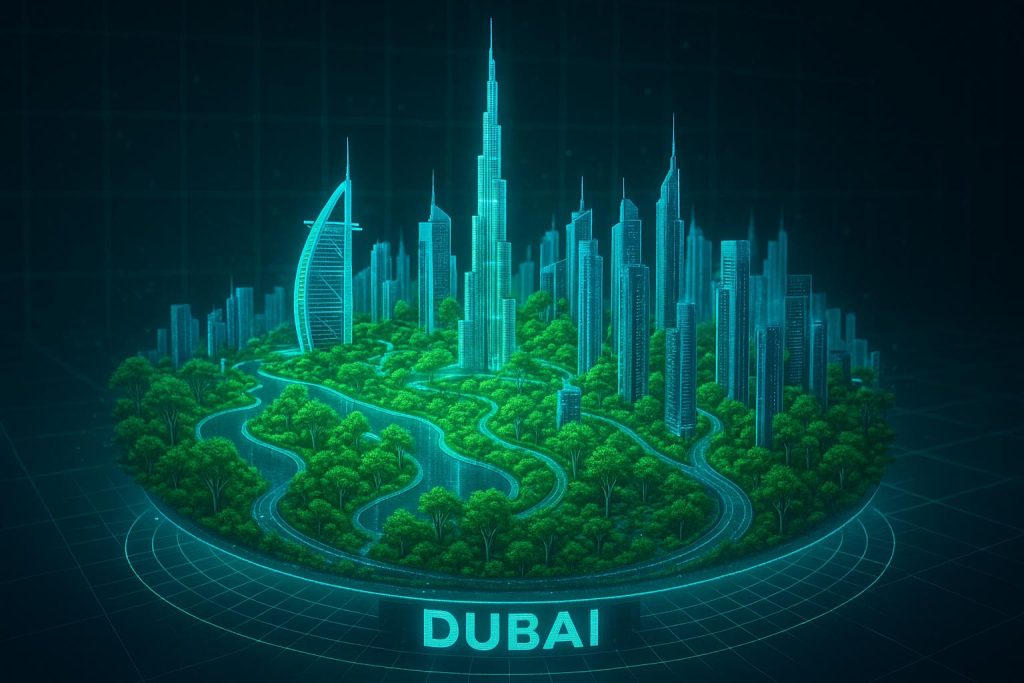Listen to the article
AI is accelerating across the Middle East, with regional governments and industries leveraging the technology to boost GDP, drive innovation, and promote sustainable development amidst ambitious strategic initiatives.
Artificial intelligence (AI) has transitioned from a futuristic concept to a tangible economic driver across the Middle East, reflecting a growing regional embrace of the technology’s transformative potential. This shift was underscored in recent global forums such as the World Economic Forum’s focus on “Intelligent Economies.” From the ultramodern cities of Dubai to rural agricultural zones in Jordan and Morocco, AI initiatives are steadily permeating diverse sectors, illustrating the technology’s role as a key engine for growth in the region.
Industry analysis from PwC projects AI’s economic impact in the Middle East could exceed $300 billion by 2030, representing approximately 11% of the region’s GDP. The UAE is expected to experience the most pronounced boost, with AI contributing nearly 14% to its GDP, while Saudi Arabia could see a contribution of around 12.4%. These figures highlight the significant opportunities AI presents not just for affluent Gulf economies but also for emerging markets such as Egypt, Jordan, and North African countries which are also adopting AI strategies to propel inclusive development.
The Gulf Cooperation Council (GCC) countries stand out for their ambitious commitments and wide-ranging AI investments. The UAE pioneered the appointment of the world’s first AI minister and has implemented a comprehensive AI Strategy 2031 targeting sectors including education, healthcare, governance, and energy. Abu Dhabi plans to host one of the world’s largest AI data centres, signalling substantial infrastructure development. Meanwhile, Saudi Arabia has integrated AI vigorously within its Vision 2030 blueprint. The Kingdom’s launch of HUMAIN, an AI platform fostered by the Public Investment Fund and personally championed by Crown Prince Mohammed bin Salman, will deliver advanced AI infrastructure, cloud capabilities, and one of the most powerful multimodal Arabic large language models globally. These initiatives underscore Saudi Arabia’s strategic focus on AI to diversify its economy and enhance innovation across sectors.
Beyond the Gulf, emerging economies in the region are leveraging AI to address specific national challenges and catalyse economic opportunities. Egypt’s AI strategy, initiated in early 2024, prioritises healthcare and fintech as key growth sectors, aiming to augment financial inclusion. Jordan has embarked on a five-year AI plan involving sixty-eight projects targeting healthcare, logistics, and other vital areas. North African nations like Morocco, Tunisia, and Algeria also play an active role within the African Union’s endorsed AI Continental Strategy, which envisions AI as a tool for broad continental development.
Practical applications of AI reveal its widespread benefits across Middle Eastern industries. Morocco employs AI-driven smart agriculture techniques—using drones and sensors to monitor soil conditions and combat crop diseases—optimising yields and resource management. In the UAE, AI integration into the Emirates Healthcare System has improved diagnostic accuracy for over 500 patients and streamlined diabetes treatment processes, reducing care time significantly. Egypt’s Suez Canal, a critical global trade artery, utilises AI to enhance operational efficiency and environmental management. The financial services industry is notably impacted, with AI potentially contributing up to 13.6% to the regional GDP by 2030 through fintech innovations in wealth management, payments, and beyond. Urban development is also being shaped by AI, as seen in Dubai’s Smart Dubai initiative, Qatar’s Lusail City, and Saudi Arabia’s NEOM project, alongside Egypt’s plan for a new administrative capital designed as a smart city.
PwC research further highlights the broader economic trajectory, suggesting that with strategic AI adoption coupled with climate resilience efforts, the Middle East could add an additional $232 billion to its GDP by 2035. These intertwined priorities of AI-driven productivity and sustainability are critical for the region’s long-term economic future, estimated to reach $4.68 trillion GDP by 2035. PwC underscores that coordinated policies are essential to responsibly embed AI across industries, foster climate adaptation, and invest in human capital to realise this potential.
Saudi Arabia, in particular, stands as a case study of how AI can be harnessed for transformative growth. Strategy& projects that AI could add $135 billion to the Kingdom’s GDP by 2030 while tackling pressing issues such as food security and public service efficiency. The kingdom’s AI-driven ventures into renewable energy and water resource management are further illustrative of technology’s role in promoting sustainability alongside economic diversification efforts.
Taken together, these developments demonstrate a consistent narrative across the Middle East: AI is no longer a distant ambition but an active reality shaping economic landscapes and societal progress. From the highly developed GCC bloc to emerging economies and the wider African context, AI is being wielded as a catalyst for inclusive growth, improved public services, and sustainable development, aligning with global aspirations while tailored to regional needs.
📌 Reference Map:
- Paragraph 1 – [1], [4]
- Paragraph 2 – [1], [2], [7]
- Paragraph 3 – [1], [5], [6], [7]
- Paragraph 4 – [1], [6]
- Paragraph 5 – [1], [6]
- Paragraph 6 – [1], [2], [3], [4]
- Paragraph 7 – [1], [3], [6]
Source: Noah Wire Services



